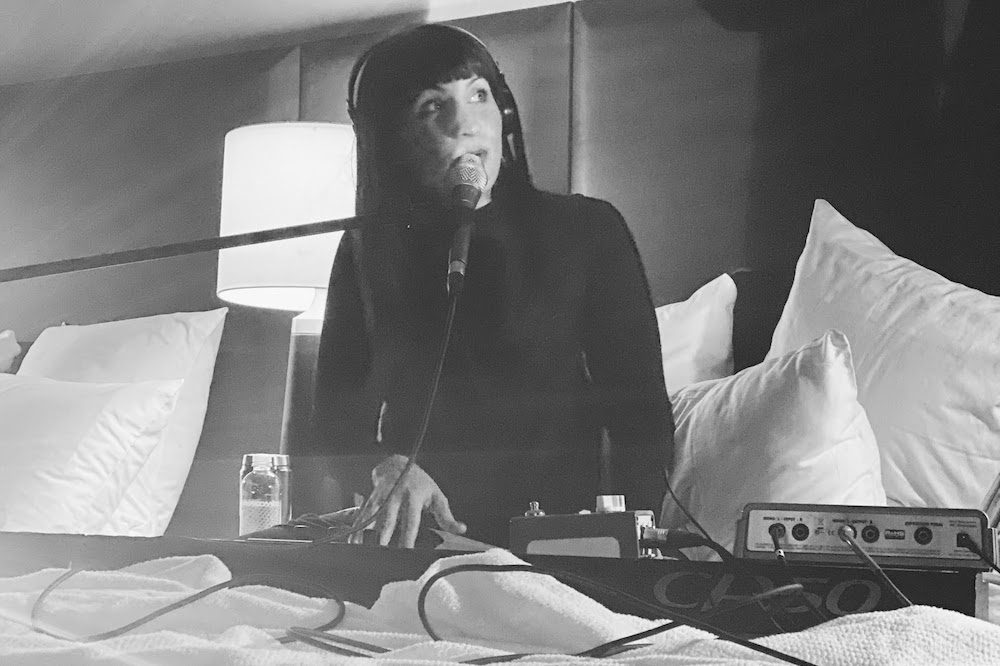

Sarah Magill has the strangest dreams. Quite recently, the Quiet Takes singer/songwriter imagined herself singing backup for Wilco, but “I didn’t know all of the words,” she recalls. Guitarist Nels Cline turned to her “with a big smile on his face and said, ‘It’s okay—we’re making music and that’s the important part!'”
Her dreams serve not only as a source of great amusement but thematic material for her songwriting. On “Guess Who Showed Up Again,” an essential cut on her new EP Weekly, Weakly, Magill pulls a recurring dream character into the real world. “Met you at the car wash/Trading Bisquik recipes,” she unspools. “Told me it was no loss/No one else I needed to be.”
“Mostly, my dreams are weird or disconcerting—but once in a while, I have dreams that are very reassuring,” she explains over a recent phone call. “So, this character just shows up, and we’ll do something really silly and symbolic, like we’ll be walking down a cobblestone street and we’ll stop and open up a little lockbox and there’ll be a key inside and it’ll hand me the key. It’s really kind of ridiculously beautiful moments. That character just shows up a lot, and I started writing that song after one of those dreams.”
Magill has been dream journaling her whole life, but she didn’t start chronicling her midnight reveries in earnest until early 2020. “I find my dreams really entertaining,” she laughs. When truly inspired by a dream, she’ll sit down at her computer and use the website 750 Words, “a fun idea based on Morning Pages,” she says, “so that every day you go in, they’ll tell you when you get to 750 words. It’s great if you have an actual writing project, and you want it to see the light of day. But it’s also really good if you just need to get all your stuff out in the morning.”
“So, now, I’ll wake up, and I’ll just type everything out real quick, if I can remember my dream, which is most days,” she adds. “It’s been a really good practice for me.”
Weekly, Weakly (co-produced with David Bennett) whirls round and round with dreamy arrangements and blurry-eyed production, casting the listener into a deep trance. Regret and loneliness vine together to culminate in a moody, sonically-seductive EP, born out of the weekly tradition, referenced in the title, Magill and Bennett started last summer. Each Friday, the two would meet up in the studio to play and tinker around with lyrics and sounds. “We basically did that for about 11 months, until this summer, which is not an efficient way to make music at all. But it was kind of necessary for the time we were in. It was efficient for mental health in having a place to go and a job to do.”
While the six songs drench in “the emotional and mental fallout of the pandemic,” as she told Dusty Organ earlier this year, she had already been in the throes of such probing work. “Some of the themes I was already dealing with were just heightened. I was already writing a lot about loneliness and social insecurity and trying to find where you belong before the pandemic.”
But the lockdowns put “all those feelings on steroids, and then all of a sudden, it wasn’t just me thinking about it. It became a topic where we were all talking about a lot more,” she reflects.
“Talking to Album Covers” crunches layers of percussion together, as if Magill is flipping through a crinkled, yellow-paged storybook. Within its flecked melancholia, she attempts to make sense of a world shrouded in the darkness and isolation. “I literally put up some album covers that feature full face photos on my vinyl shelf, and I would talk to them. It was a real low point,” she admits. “It’s not like I didn’t ever talk to humans, but in that first stretch of three or four months where I was being really careful, I would only see friends on walks.”
Her loneliness hung like a funeral veil, closing off her world with a somber, chilly tint. “I think what was difficult with this batch of songs was I was trying to finish them during the pandemic. I was living alone. Everybody had different challenges, and so I felt like I was just really struggling to communicate what I was feeling and doing that in a musical way that didn’t feel trite or overwrought or cliché.”
“It wasn’t writer’s block; it was writer’s sludge. I remember one day at the studio, I was sitting on the concrete floor and trying to rewrite some lyrics, and then finally giving up and being like, ‘Yep, I got absolutely nothing. I have no thoughts in my head today.’ And that’s okay. I just needed to go home.” Laughing, she quickly adds, “You can get in the habit of writing and journaling and going to the studio — but you also have to know when it’s just time to take a nap.”
Ultimately, Magill has achieved a kind of timelessness and universality with this body of work—any worry that it might sound trite or cliché proves to be unfounded with relatable, candid songwriting. On “What I Should Have Said,” she strives to find peace within herself from a mangling of regret and sorrow. “There’s a lot of layers to [this] one. The main emphasis being I wish that I would have said something to a friend that I never did,” she says. “And I think we all have those. We all have those moments of regret when we look back on a situation.”
“Funny, I was talking about regret with some friends this weekend. We were driving around and going to a show, and one of my friends is very positive. I was talking about regret, and I think she was worried that it was going to make me depressed,” continues Magill. “I fully believe in [having] regrets, because they teach you, if you’re willing to learn from them. I’m deeply motivated to not make certain mistakes in my life anymore. I have sat with that regret, and I know what that feels like. I see moving forward. I was joking, ‘That’s going to be on my tombstone 一 just regret.’”
Throughout the process, and in navigating the ebb and flow of mental health, songwriting has anchored a growing understanding of her emotions. “I’m basically writing so I remember something I need to remember. In ‘What I Should Have Said,’ I’m trying to remind myself to say what you need to say, be present, and don’t feel regret like this again. That’s how I’ve learned about myself. I’m hoping as I learn more and get deeper into the craft that it will hopefully not just be about me anymore, and I’ll be able to tap into the more universal experience. And I’ll get better at learning from other people, too.”
On a more technical level, Magill has become better-equipped in understanding what works in the recording studio and is honing her vocal technique. “I’ve started to add some little pieces to my own, so I can do better demos at home, like getting a good preamp and a compressor,” she says. “On this album, I’m continuing to learn how to sing in the studio better and finding what mics work for me. I think I’ll be learning this forever, but I’m learning how to give a technically acceptable take. I have a lot of mouth noises, and I’m trying to figure out how to get rid of my mouth noises.”
With Weekly, Weakly, Magill marks this time and season of her life with a strong, thought-provoking body of work and invites the listener to show up for themselves, even when times are tough. “This is to remind myself and other people that you don’t have to go into any project knowing what you’re doing,” she offers, “and you don’t have to go into it feeling strong. I’m definitely a perfectionist, and that can be a defense mechanism for me.”
“Even if you’re weak, even if you think you have nothing to give, showing up is the important part,” she adds. “If you just keep showing up, something will come of it. The discipline is showing up despite feeling like you have nothing to give.”
Follow Quiet Takes on Twitter and Instagram from ongoing updates.



